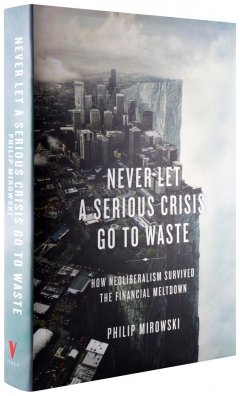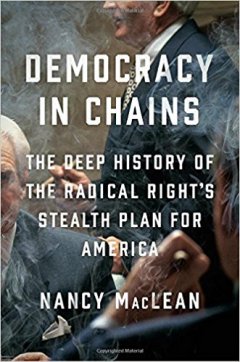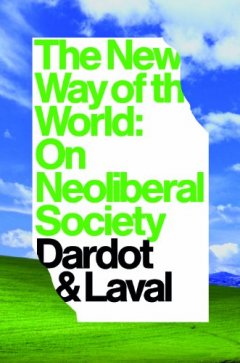The Neoliberal Conspiracy
|
|
|
|
Western Neoliberal Politicians let Finance Control Finance |
|
|
|
|
“The movement toward the neoliberal utopia of a pure and perfect market is made possible by the politics of financial deregulation. And it is achieved through the transformative and, it must be said, destructive action of all of the political measures (of which the most recent is the Multilateral Agreement on Investment (MAI), designed to protect foreign corporations and their investments from national states) that aim to call into question any and all collective structures that could serve as an obstacle to the logic of the pure market: the nation, whose space to manoeuvre continually decreases ... (..) In this way, a Darwinian world emerges - it is the struggle of all against all at all levels of the hierarchy, which finds support through everyone clinging to their job and organisation under conditions of insecurity, suffering, and stress.Pierre Bourdieu, Essence Neoliberalism, 1998, LMD
|
|
|
|
|
|
|
|
|
Today's US Corporate Control of Politics & Financial System
"For over a decade there has been an unofficial and underreported agreement between Wall Street Executives, our Congress and the Department of Justice. The agreement is simple, Wall Street will do what it pleases and continue to share its wealth with our Politicians and in return our Politicians will make sure the Department of Justice never prosecutes the Wall Street Executives" Wall Street Demanded the Nuclear Option and the Congress Delivered, 2017, R Lawless
"Trade agreements currently being negotiated or already approved introduce numerous restrictions over the right of states to regulate, especially in the field of financial regulation, and limits their capacity to react to ensure financial stability. The report draws this conclusion after analysing bilateral agreements already negotiated such as CETA and JEFTA, those still under negotiations or suspended (TTIP), as well as the plurilateral Trade in Services Agreement (TiSA). - The very idea of including financial services in these trade agreements, with the specific objective to increase production and exchange volumes in this sector, goes against lessons learned from the last global financial crisis." Financial Regulation challenged by European Trade Policy, 2018, Finance Watch
The next four links from HS Modern Monetary Theory page link
"Doesn’t it strike you as odd that, for more than five decades now, the U.S. government has been issuing and spending trillions of dollars of U.S. FIAT currency, and not once has a mainstream economist, journalist, or political leader found it worthy of consideration to even try to explain—from the perspective of what economic policy is all about—what a sovereign fiat currency actually is, and how it functions?" Money: The High Cost of Betrayal, March 1, 2018 by J. D. Alt, Naked Capitalism
"The Federal Reserve is private in name only. Its heads are appointed by Washington, but Wall Street has veto power over it (as it has over the appointment of major Treasury and other regulatory agency officials). So the problem is not that the Fed is technically owned by its stockholders, but that Wall Street has gained overpowering control over government itself. - The financial sector has sought to dismantle checks and balances, making it protect Wall Street even as financial interests diverge from the promoting of economic growth and rising living standards." Federal Reserve System, interview with Michael Hudson, 2012
Pierre Bourdieu said that the Western neoliberal establishments actively let finance powers control the Western societies. This make the politicians (seem) powerless, as if they don't control their nations' financial system and their "money machines". With Hudson's explanation above, we can say that European nations have copied the American way. But mind you, it is a lie, an orchestrated neoliberal myth, as long as we are talking about nations, which have their own currency. Whether it be the dollar or the Danish krone etc.
"I have been reading the new book by Costas Lapavitsas – ‘The Left Case Against the EU’ – which has been recently published. It is solid and clearly explains why the EU is not an institution or structure than anyone on the progressive Left should support or think is capable of reform any time soon. It has become a neoliberal, corporatist state and hierarchical in operation, with Germany at the apex bullying the weaker states into submission. Divergence in outcomes across the geographic spread is the norm. It is also the anathema of our concepts of democracy both in concept and operation. It is more like a cabal of elites who are unelected and, largely unaccountable. By giving their support to this monstrosity, the traditional Left political parties (social democrats, socialists etc) have been increasingly wiped out such is the anger of voters to what has become a massive coup by capital against labour. These are the themes that Thomas Fazi and I also explored in our recent book – Reclaiming the State: A Progressive Vision of Sovereignty for a Post-Neoliberal World (Pluto Books, 2017).", Financial services agreements – the EU as a neoliberal, corporatist project, Nov. 2018, Bill Mitchell
"I was reading John Maynard Keynes recently – circa 1928 – that is, 8 years before the publication of the General Theory with his Treatise on Money intervening. He was railing against the principles and practice of ‘sound finance’, which he noted had deliberately caused billions of pounds in lost income for the British economy. He urged the Treasury and the Bank of England to abandon their conservative (austerity) approach to the economy and, instead, embark on wide-scale fiscal stimulus to create jobs and prosperity. He concluded that with thousands of workers idling away in mass unemployment that it was “utterly imbecile to say that we cannot afford” to stimulate employment via large-scale public works – building infrastructure etc. He considered the policy makers who opposed such options were caught up in “the delirium of mental confusion”. The stark reality is that 88 years later, he could have written exactly the same article and would have been ‘right on the money’." We are being led by imbeciles, 2016, Bill Mitchell
"Theft of a Nation demonstrates the great truths that both major political parties do not want the public to understand. We suffer recurrent, intensifying financial crises because of elite frauds led from the ‘C’ suites of our most prestigious financial institutions. Those frauds are financial super predators that drove the Great Recession. They are mass destroyers of wealth. Theft of a Nation explains why and how our financial system has been made so inviting to these frauds and the human cost of their crimes. It also offers suggestions on how to avoid these disasters. It is up to each of us to learn how these frauds operate and join the fight against them because big finance is the leading source of political contributions for both parties. Readers of Theft of a Nation will discover that while learning about the crisis is sure to enrage anyone with a functional moral compass it can also be done through ‘a good read’." -- William K. Black, former US regulator and author of The Best Way to Rob a Bank Is to Own One: How Corporate Executives and Politicians Looted the S&L Industry
"A report published today from Andrew Baker of the Sheffield Political Economy Research Institute, Gerald Epstein, University of Massachusetts, and Juan Montecino, Columbia University, NY, suggests that the cost to the UK economy in terms of lost growth potential arising from hosting an oversized financial services industry was in the region of £4,500 billion between 1995 and 2015." Costing the Country: Britain’s Finance Curse, October 6, 2018 by Yves Smith, Naked Capitalism - In the Independent
The video below indicates the problem of a divide between a political elite blindly supporting the corporate power structure of society against ordinary people. Saving the economy the american government compensated Goldman Sacks, a company much co-responsible for the crisis, with 12 billion dollars (12.000 million dollars or about 75.000 million Danish Krones). The stimulus package for the entire American economy was less than 9 billion dollars. - Obama then chose the same people (Bernanke) most responsible for the Feds' politics leading to the crisis to handle the crisis (on Geithner's/Feds' responsibility). Bernanke thinks himself a hero for his role. Eliot Spitzer: Geithner, Bernanke Complicit in Financial Crisis and Should Go
|
|
|
|
|
|
|
|
|
“Forgive them not, they know what they doArnulf Øverland
Japan/MMT explain the 2008 aftermath
"Nomura Research Institute's Richard Koo says that what the world is experiencing right now, a "balance sheet recession," is different from traditional recessions. However, Japan recently experienced a similar type of recession, and Koo says we can learn a lot from that country's experiences. Interviewed by Daniel Erasmus at King's College, April 2010." Richard Koo - A "Balance Sheet Recession", 2010, NEC
|


